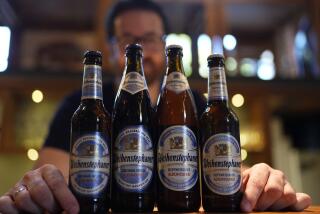Czechs Look Longingly at World Beer Market : Beverages: Brewers aiming for longer shelf life and higher technological standards for packaging while retaining quality of nation’s famed brews.
- Share via
CESKE BUDEJOVICE, Czechoslovakia — In a post-communist world where everything seems to be changing, Czechs can take solace in a few remaining signs of stability.
Like beer.
Beer drinking is in some ways the soul of Bohemia, the Czech lands encompassing the western part of this Slavic federation in the heart of Europe. Czechs have been growing hops for at least 1,100 years, and their brewers introduced the world to the liquid gold of lager.
Now the raising of the Iron Curtain has reopened the craftsmanship of Bohemia’s master brewers to a world of beer drinkers. But it also presents them with a dilemma: how to tap the world market, and the world’s riches, without losing their soul.
Brewers who have been frozen in time with their Old World techniques, concentrating only on quality, are faced with modern capitalist problems: how to modernize their old plants to increase production, where to get the capital, how to ensure the consumer is satisfied, and how to price the product.
Beer makers such as Ceske Budejovice’s Budvar, the original Budweiser, and Pilsner Urquell in Pilsen (Plzen) are trying to reconcile the need to maintain their brewing traditions with improvements necessary to capture a share of the world market.
“For 40 years we have focused on taste only,” says Antonin Kratochvile, head of the Assn. of Czech Brewers and longtime Budvar chief. “We have milked the breweries for what they were worth, with no money coming back in.”
Now, longer shelf life needed for transportation around the world and higher technological standards in packaging are absolute musts for the modern brewer.
But in the process of modernization, Kratochvile adds, “we would hate to see the outstanding quality of our beer diluted by purely commercial interests.”
So would Czech beer drinkers.
Only 30 miles east of the German border, the cities of Pilsen and Ceske Budejovice stand proud amid the rolling hills of southwest Bohemia.
Their fame under the German names of the Austrian Empire, Pilsen and Budweis, spread with the expansion of export by rail in the 19th Century.
The name Budweis spread to the United States with Adolphus Busch. A Bavarian immigrant, he acquired the rights to sell Budweiser in North America, and his brewery became the St. Louis giant Anheuser-Busch.
Czechs are second only to Germans in regular consumption of beer, be it in taverns, bars or at home. Their Slovak cousins to the east prefer wine.
Total annual beer production is 2.1 billion liters, making this one of the most intense brewing areas in the world.
Modernity is encroaching on this tradition.
Both Pilsner and Budvar are already available in cans to satisfy the thirsty in Europe’s discos and on the beaches. To Czechs, the taste of canned beer feeds the suspicion that “cans are for sauerkraut, not for beer.”
“I wonder if this is an insult or insanity,” mused Frantisek Kotva, a leading rock guitarist, sipping a lukewarm canned version of his favorite brew.
Putting a price on a beer is also a puzzle for Czechs in the post-communist world.
A half-liter of exquisite Pilsner Gambrinus still sells for the equivalent of 15 cents in a rural tavern. But prices of more than a dollar a can are no longer a surprise in tourist-swamped downtown Prague.
Such prices don’t sit well with Czechs. As the “Good Soldier Schweik,” author Jaroslav Hasek’s insolent World War I foot soldier, observed: “A government that raises the price of beer won’t see the next plum harvest.”
Pilsner Urquell and Budvar belong to the prestigious family of lagers brewed exclusively from Czech hops grown in the red clay around Zatec, 40 miles northwest of Prague.
The hoppier Urquell is loved for its bread-like vollmundigkeit , a German expression describing its full-bodied flavor.
The sweeter and deeply fermented Budvar, with a relatively high 5.1% alcohol content, is an ideal companion to heavy Czech food, and its slightly bitter aftertaste tempts many a drinker to have another.
Brewers say the envied secrets of Czech beer lie in clean-tasting malting barley, soft water and the long lagering technique in centuries-old, pitch-lined oak vessels.
The maturity of the beer is often demonstrated by placing a heavy coin on top of the foam in the 2-yard-wide vessel. Master brewers quip: “The beer is so good that it keeps our currency afloat.”
Many Czechs are eager to have the breweries help keep them afloat financially in the tough times that are following communism.
Under the current privatization schemes, the state-owned Czech breweries will become shareholders’ companies by 1994.
Hundreds of people who have inherited ancient “brewing rights” and brewery staff can acquire about 10% of the stock at low prices.
Another 50% is among the choicest stock up for grabs among Czechs. Eight million citizens have invested in coupons issued by the government for a nominal price that they may then invest in Czechoslovak companies.
The breweries are a popular choice because of widespread perception they are sure to make the transition to capitalism, unlike many other moribund state-run industries.
But Miloslav Jerabek, general manager of Plzenske Pivovary, the brewers in Pilsen, conceded, “There is no way we can make it without Western capital in the long run.”
The Pilsen breweries alone require $180 million in investment, almost three times the book value of the 150-year old chain employing 2,400 people.
Budvar would seem to have a natural foreign partner in Anheuser-Busch. But despite interest on both sides, and on-again, off-again negotiations that preceded even the fall of communism in 1989, there has been no agreement.
Anheuser-Busch is still interested, John N. MacDonough, an executive vice president for marketing, said in a telephone interview.
The St. Louis brewer is considering a 30% share in Budvar. That’s enough to provide a substantial amount of money for modernization but well below a controlling interest.
Czechs would not accept foreign control. They are suspicious that this would ultimately make their beer taste like the lighter American Budweiser.
MacDonough says Anheuser-Busch could show brewers in Ceske Budejovice how to expand without changing the taste of the beer they now produce.
“It is definitely possible to expand the product without changing the taste,” he says.
More to Read
Sign up for Essential California
The most important California stories and recommendations in your inbox every morning.
You may occasionally receive promotional content from the Los Angeles Times.













